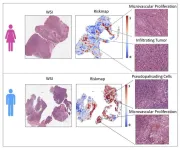(Press-News.org) OXFORD, Miss. – America’s obsession with grades is failing students and jeopardizing the future of education, a University of Mississippi professor argues in his new book.
Josh Eyler, director of the Center for Excellence in Teaching and Learning, recently released “Failing Our Future: How Grades Harm Students, and What We Can Do About It” (Johns Hopkins University Press), in which he argues that the traditional system of grading is harmful to students.
“This book looks at the issues with grades in learning, the kinds of Issues grades cause with parents and children, and how grades magnify inequities and how they are a contributing factor to the mental health crisis,” said Eyler, a clinical assistant professor of teacher education at Ole Miss.
"The second part (of the book) looks at what parents, teachers, schools and universities can do to help mitigate the damage.”
More than 70% of American high school students report anxiety and depression as being a "major” concern for their peer group, and suicide is the third-leading cause of death in people aged 14-18. The student mental health crisis may have been magnified by the COVID-19 pandemic, but its roots go much deeper.
“We've also known for a long time that mental health among students is bad and getting worse,” said Emily Pitts Donahoe, the center's associate director of instructional support. “We think a lot about ways to help students deal with academic stress, but we don't always think about how to get to the root of those problems and actually mitigate some of the practices that are causing that stress.
“One of the things that I think is so great about Josh's book is that it helps us see that.”
Traditional grading also reinforces inequity, Eyler said.
Students whose schools have received more funding often have more tutoring, more teachers and more resources for students. Students from those schools often receive higher grades, are more prepared for college and are often selected for more opportunities.
“There have been inequities that have been baked into the fabric of American education from its founding,” Eyler said. “States and local governments have historically diverted more funding to wealthy white communities and less funding to communities that historically marginalized groups have lived in.
“What does that mean in the long term for the schools with fewer resources? Fewer textbooks, higher teacher turnover and fewer educational opportunities for students.”
This inequity makes grades more a reflection of the opportunities a student has been given, not how intelligent or capable a student is, he said.
“The grades are reflections of their past inequitable educational experience, rather than their potential for what they could do in the field, right?” he said. “The issue is those low grades shut doors when those students could potentially have succeeded in any number of ways.”
Besides being a source of anxiety and inequity among students, the grading system is also set up to reduce students’ intrinsic motivation and curiosity for learning, he said.
“Intrinsic motivation is what is necessary for deep learning to happen,” he said. “People need to want to learn for their own sake. They need to be interested, curious about all those things in order to learn in a meaningful way.
“Grades, however, are classic extrinsic motivators – straight out of the school of behaviorism. They are prizes and rewards for certain behaviors that communities – in this case, schools and colleges – are prioritizing.”
Instead of teaching students to be curious, the traditional grading system forces students to memorize information long enough to pass a test or quiz. Instead of encouraging students to take risks and innovate, grading teaches them to be compliant, he said.
But alternatives exist. Many colleges, high schools and even middle schools – including professors such as Donahoe and Eyler –practice alternative methods of grading.
The first step towards a newer, better education system is understanding the problem, Donahoe said.
“As an individual, I can make a lot of changes to my grading and I have a lot of freedom, especially in the higher ed space, to experiment,” she said. "But systemic change, it requires the cooperation of parents, administrators, K-12 teachers, higher ed teachers, even employers and graduate schools. It requires a lot of people.
“That's why Josh's book is important, because it puts all of those different pieces in conversation with each other.”
END
Professor gives American grading system an F
Grading system can harm students' motivation, mental health and success
2024-10-07
ELSE PRESS RELEASES FROM THIS DATE:
NIH awards $2.2 million to UMass Amherst to explore new tuberculosis therapies
2024-10-07
AMHERST, Mass. – The National Institutes of Health recently awarded $2.2 million to Alissa Rothchild, assistant professor in the Department of Veterinary and Animal Sciences at the University of Massachusetts Amherst and an expert in tuberculosis (TB) immunology, to study the very first cells that respond to Mycobacterium tuberculosis (Mtb), the bacteria causing TB.
How those initial cells, known as alveolar macrophages, or AMs, respond to the bacteria is not entirely known, though Rothchild and her lab have shown in a previous study that AMs don’t respond to Mtb infection the way other macrophages do. Instead of mounting a strong inflammatory response, AMs turn on a cell-protective ...
Immune-based treatment gets a boost to its cancer-fighting superpowers
2024-10-07
Imagine a world where your own immune cells are transformed into cancer-fighting superheroes. This is the promise of CAR-T cell therapy, a groundbreaking treatment that’s already saving lives.
In this therapy, patients’ own immune cells are collected, genetically engineered so that they specifically target cancer cells, then returned to the body. The result is a potent new option for battling blood cancers. However, as with any superhero journey, the process of harnessing this incredible power comes with ...
First report of its kind describes HIV reservoir landscape in breast milk
2024-10-07
Embargoed for release until 5:00 p.m. ET on Monday 7 October 2024
@Annalsofim
Below please find summaries of new articles that will be published in the next issue of Annals of Internal Medicine. The summaries are not intended to substitute for the full articles as a source of information. This information is under strict embargo and by taking it into possession, media representatives are committing to the terms of the embargo not only on their own behalf, but also on behalf of the organization they represent.
----------------------------
1. First ...
Penn Nursing study finds link between nurse work environment quality and COVID-19 mortality disparities
2024-10-07
PHILADELPHIA (October 7, 2024) – A new Penn Nursing Center for Health Outcomes and Policy Research (CHOPR) study – published in INQUIRY – has found a strong association between the quality of the nurse work environment and COVID-19 mortality rates among socially vulnerable Medicare beneficiaries. The study examined data from 238 acute care hospitals across New York and Illinois.
The researchers found that patients from socially vulnerable communities, including those facing higher levels of poverty, housing insecurity, and limited transportation, were more likely to die from COVID-19 if they were ...
Systematic review highlights decline in mental health care and increase in suicides following FDA youth antidepressant warnings
2024-10-07
Key Takeaways:
A new systematic review led by the Harvard Pilgrim Health Care Institute examined a wide body of evidence documenting pediatric mental health outcomes in the period following FDA Black-Box Warnings that antidepressants may be associated with suicidal thoughts and behaviors among youth.
The data indicate that these warnings, meant to increase monitoring of suicidal thoughts and behaviors, resulted in reduced essential medication use and mental health treatment of pediatric depression and increased suicide attempts and deaths.
The findings support a re-evaluation of the Black-Box ...
Food insufficiency increased with expiration of pandemic-era SNAP emergency allotments
2024-10-07
Embargoed for release: Monday, October 7, 4:00 PM ET
Key points:
Among more than 15,000 SNAP participants across 35 states, food insufficiency increased by 8.4% after pandemic-era Supplemental Nutrition Assistance Program (SNAP) emergency allotments expired. Emergency allotments provided participants up to $250 additional support per month.
Emergency allotment expiration also led to a 2.1% increase in use of food pantries and a 2% increase in difficulty paying expenses, as well as greater anxiety symptoms among Black SNAP participants.
According to the researchers, the findings ...
Better-prepared emergency departments could save kids’ lives cost-effectively, Stanford Medicine-led study finds
2024-10-07
Most U.S. hospital emergency departments — lacking staffing, training and equipment — are not fully prepared to care for children. Maximizing their readiness to handle pediatric emergencies would be a cost-effective way to save children’s lives, according to a new Stanford Medicine-led study.
The study, which will publish Oct. 7 in Health Affairs, is based on data from hundreds of hospitals in 11 states. About 80% of emergency departments are not highly prepared to treat children, they found. The research team studied whether it would be cost-effective to upgrade these less-prepared emergency departments to make them more ready to treat babies, ...
Supplemental Medicare benefits still leave dental, vision, and hearing care out of reach for many
2024-10-07
Lower-income adults with Medicare Advantage plans are more likely to have difficulty paying for dental, vision, and hearing services than higher-income beneficiaries—despite enrolling in plans that cover these benefits, according to a new study published in Health Affairs.
Medicare Advantage plans offer a private insurance alternative to traditional Medicare coverage for health insurance. The most common supplemental benefits are dental, vision, and hearing, with more than 90 percent of Medicare Advantage plans providing coverage for one or more. These supplemental benefits, which are ...
UW–Madison researchers use AI to identify sex-specific risks associated with brain tumors
2024-10-07
MADISON — For years, cancer researchers have noticed that more men than women get a lethal form of brain cancer called glioblastoma. They’ve also found that these tumors are often more aggressive in men. But pinpointing the characteristics that might help doctors forecast which tumors are likely to grow more quickly has proven elusive. University of Wisconsin–Madison researchers are turning to artificial intelligence to reveal those risk factors and how they differ between the sexes.
Radiology and biomedical engineering professor Pallavi Tiwari and her colleagues have published ...
George Mason researchers conducting AI exploration for snow water equivalent
2024-10-07
George Mason Researchers Conducting AI Exploration For Snow Water Equivalent Forecasting In Western U.S. With Physics-Informed Neural Network & GeoWeaver
Ziheng Sun, Research Assistant Professor, Center for Spatial Information Science and Systems (CSISS), Geography and Geoinformation Science, College of Science; Mingrui Liu, Assistant Professor, Computer Science, College of Engineering and Computing (CEC); and Keren Zhou, Assistant Professor, Computer Science, CEC, are studying the dynamics of snow water equivalent (SWE).
SWE measures the amount of water available in snow.
The researchers will use ...
LAST 30 PRESS RELEASES:
The Lancet: Single daily pill shows promise as replacement for complex, multi-tablet HIV treatment regimens
Single daily pill shows promise as replacement for complex, multi-tablet HIV treatment regimens
Black Americans face increasingly higher risk of gun homicide death than White Americans
Flagging claims about cancer treatment on social media as potentially false might help reduce spreading of misinformation, per online experiment with 1,051 US adults
Yawns in healthy fetuses might indicate mild distress
Conservation agriculture, including no-dig, crop-rotation and mulching methods, reduces water runoff and soil loss and boosts crop yield by as much as 122%, in Ethiopian trial
Tropical flowers are blooming weeks later than they used to through climate change
Risk of whale entanglement in fishing gear tied to size of cool-water habitat
Climate change could fragment habitat for monarch butterflies, disrupting mass migration
Neurosurgeons are really good at removing brain tumors, and they’re about to get even better
Almost 1-in-3 American adolescents has diabetes or prediabetes, with waist-to-height ratio the strongest independent predictor of prediabetes/diabetes, reveals survey of 1,998 adolescents (10-19 years
Researchers sharpen understanding of how the body responds to energy demands from exercise
New “lock-and-key” chemistry
Benzodiazepine use declines across the U.S., led by reductions in older adults
How recycled sewage could make the moon or Mars suitable for growing crops
Don’t Panic: ‘Humanity’s Last Exam’ has begun
A robust new telecom qubit in silicon
Vertebrate paleontology has a numbers problem. Computer vision can help
Reinforced enzyme expression drives high production of durable lactate-based polyester
In Rett syndrome, leaky brain blood vessels traced to microRNA
Scientists sharpen genetic maps to help pinpoint DNA changes that influence human health traits and disease risk
AI, monkey brains, and the virtue of small thinking
Firearm mortality and equitable access to trauma care in Chicago
Worldwide radiation dose in coronary artery disease diagnostic imaging
Heat and pregnancy
Superagers’ brains have a ‘resilience signature,’ and it’s all about neuron growth
New research sheds light on why eczema so often begins in childhood
Small models, big insights into vision
Finding new ways to kill bacteria
An endangered natural pharmacy hidden in coral reefs
[Press-News.org] Professor gives American grading system an FGrading system can harm students' motivation, mental health and success




